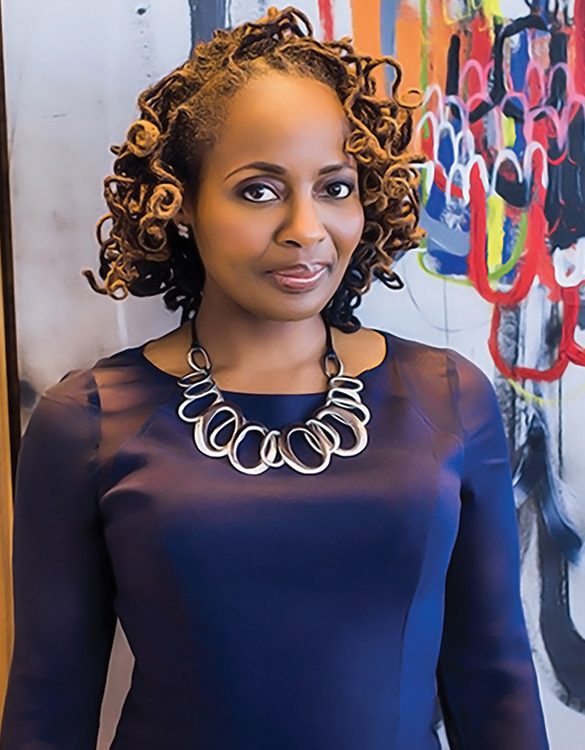For many students, the choice of a major often comes down to personal interests or a vague notion of wanting to maximize future income.
Alumna Sheryl Ponds (ME ’87) took a different approach.
For her, it was a desire to make the world a better place—something that first was on display when she was an eighth grader.
“We had a science fair, and I made a solar array out of trash bags,” said Ponds. “The bags were my panels, a lamp was the sun, and putting together it resulted in a flow of heated air that could be used as a power source. I came in second to someone who built a robot. To him, robots were a hobby, but my project was something that stuck with me.”
The idea of doing something to help the environment stayed with her over the years, finally leading her to establish Dai Technologies Corporation in November 2019, becoming the first Black woman electric vehicle charger infrastructure contractor and developer in the mid-Atlantic area.
DaiTechCorp scopes, sources, and installs EV charging stations, something that Ponds hopes will overcome one of the main fears people seem to have about driving rechargeable vehicles: running out of power. Called range anxiety, it has a direct impact on the willingness of people to own EVs.
“People imagine the what-if scenario of running out of power in between stations,” said Ponds. “If you run out of gas, there’s typically a station fairly close, and you can just walk and get enough gas in a jug to make it to the station. But you can’t just produce electric power in the middle of nowhere.”
She points out that gas stations are seemingly at every exit now, but there was a time that routes had to carefully be planned to make sure that fuel was nearby, and many early car models didn’t even have a gauge to show you how much fuel you had in the tank.
Residential areas, new placements in mixed-use developments, and an overall increase in locations at public facilities and parking lots are all fertile ground for new EV stations. Ponds says those advancements can help EV adoption in the same way they helped gas-powered vehicles catch on with the public.
“We basically have to build out the network to make it more viable for the average driver,” she said. “It doesn’t matter if you are talking about more eco-friendly vehicles or better preparing buildings for earthquakes—engineers take on the challenges that shape society. At our core, that’s what we do.”
Her path began with a letter from the office of UT’s Fred Brown, director of the college’s Minority Engineering Scholarship Program (now the Dwight Hutchins engineering Diversity Program). Ponds had been considering other universities but was swayed by Brown’s recruitment pitch and the promise of a significant scholarship.
“They basically said ‘We want you,’” recalls Ponds. “Up until then, I hadn’t really considered UT. But when I really thought about it, I wanted to be in a true college town, with an airport that allowed you to fly directly to DC.”
Arriving at UT in the fall of 1981, Ponds was quick to take to campus life and opportunities. She became an active member of the Black Cultural Programming Committee and joined Alpha Kappa Alpha sorority, finding her voice and making friends in both organizations.
A scholarship program born out of the oil crisis of the 1970s provided her a way to return to her passion of helping the environment by developing practical solar energy. That plan soon hit a snag, however.
“The oil crisis came to an end and prices really dropped, so I had to pivot,” said Ponds. “I liked math and science, so I stuck with engineering because I knew it would also help me get closer to addressing sustainability.”
She mentions Professor A. J. Baker as someone who supported her and drove her to succeed during her time on campus. Ponds also credits her high school teachers for preparing her for the challenges of college. Her architecture teacher, in particular, helped her realize that she needed to ramp up the effort required for tougher courses.
“I got a C from her, the first of my high school years,” said Ponds. “It made me understand how serious I needed to be. I had her class for two years, during which time I learned to hunker down and really study and work through problems.”
When asked what she would tell students about her experience and lessons learned, Ponds is quick to respond: don’t be discouraged by classes and coursework that can be hard to relate to since their work might not yet exist in the real world.
“Engineering taught me how to overcome adversity, how not to quit when I’m feeling outclassed and lacking some of the basics,” she said. “I had enough grit to persevere and achieve my goal of graduating with an ME degree. You have it also.”
It’s a determination that continues.
